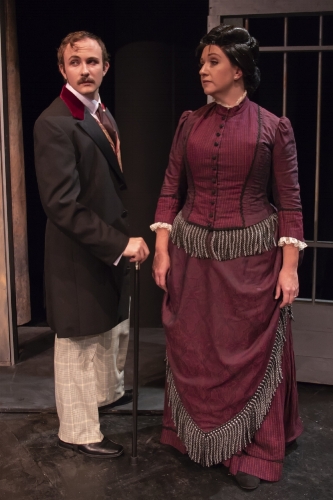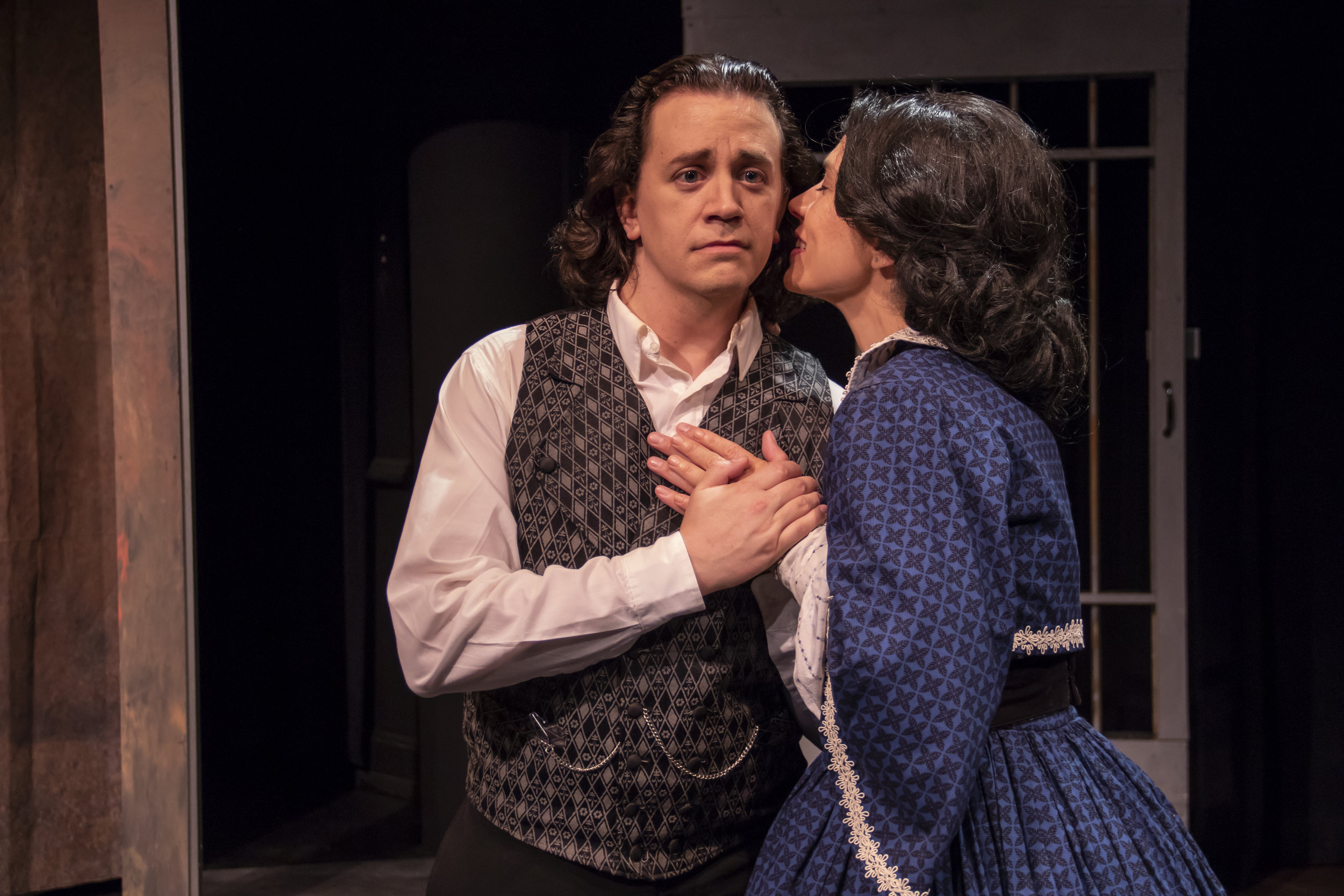theater red spotlights booth acting dynasty
Edwin Booth (Jared McDaris), John Wilkes Booth (Corey Jefferson Hagen) and Mark Gray (Brandon Haut) converse on the stage of McVicker's Theatre in a scene from "This Prison Where I Live."
By Marilyn Jozwik
Published Aug. 30, 2018
Everyone knows the story of John Wilkes Booth, President Lincoln’s assassin at Ford’s Theatre in Washington, D.C. And most everyone knows he was an actor—and not a very successful one at that.
Booth was actually part of an acting family – known as the Booth acting dynasty -- that included his father Junius and brothers Junius Jr. and Edwin, one of the 19th century’s most prominent Shakespearean actors. Though famous, Edwin carried the weight of his brother’s horrific deed, as well as that of the death of his first wife whom he adored.
Theater Red is presenting the second show in its Edwin Booth Series, called “This Prison Where I Live,” written and directed by Angela Iannone, which gives audiences a window into this intriguing character with a smart, well-tuned production.
In this show, Edwin (Jared McDaris) is rehearsing the lead role in Shakespeare’s “Richard II” in McVicker’s Theatre in 1879 Chicago, built for the father of Edwin’s wife, Mary (Marcee Doherty-Elst). The theater, which withstood two fires and was used until 1984, was raised the next year.
Ghostly visitors
Edwin is visited by the ghost of his snarky brother, John (Corey Jefferson Hagen), in the show and the two air grievances they no doubt had when both were among the living. This leads to some very humorous exchanges, such as when Edwin asks, “Are you being ironical?” John cleverly answers, “If the shroud fits.”
Edwin apparently has a talent for apparitions which allows him to also see the ghost of Mollie (Andrea Burkholder), his first wife, who died of an illness while he was miles away performing and on a drunken binge. Unlike John, Mollie’s ghost is silent, moving deliberately, gracefully, like a cloud.
Both are distractions, though Mollie’s is welcome.
Edwin is also visited during his rehearsal by his very much alive wife, Mary (Marcee Doherty-Elst), an actress who had accompanied Edwin on the stage. Mary annoys Edwin to no end with her ad nauseum fawning. It appears to be a one-sided love affair, yet Edwin feels duty-bound.
No words of comfort
In the first act, Edwin is going through his lines mechanically, even reciting and executing stage directions as he struts about the stage. When John appears, he needles Edwin mercilessly, criticizing his thespian skills by saying, “You are absurd, either overdone or underdone.” Or mocking his style on stage, as when he sits perfectly still staring into the audience.
John’s kibitzing during Edwin’s rehearsing riles the latter. But what really hits a nerve is when John chides Edwin for carelessness, especially for not tending to Mollie during her illness. “It is palpable, it is painful,” says Edwin of his feelings for his dead wife.
John Wilkes Booth (Corey Jefferson Hagen) and Mrs. Mary McVicker Booth torment Edwin in "This Prison Where I Live."
Toward the end of Act I, Edwin has another visitor, a regular theatergoer named Mark Gray (Brandon Haut) who claims he is ill and is looking for comfort from the actor. Edwin accepts the visitor but soon becomes annoyed, telling him: “I am not a speaker. I have few words outside those written for me.” It is a marvelous scene in which Edwin talks to his specter brother, as well as to the relentless Gray.
John is greatly amused by Gray’s assessments of Edwin, whom Gray calls "the ideal Hamlet.” Says John of the visit, “This has become an afternoon of nonstop hilarity.” Later events prompt John to comment that Gray “was more of a critic than we thought.”
Tortured thespian
Act II finds Edwin during intermission of the evening’s performance of “Richard II.” Edwin is bemoaning all the mishaps that occurred in Act I, including a string of pearls falling off an actress that the other performers stepped around as though they were snakes.
Edwin Booth (Jared McDaris) is visited by the ghost of his dead wife Mollie (Andrea Burkholder) in "This Prison Where I Live."
But in Act II it is Edwin’s turn to rail at John, who visits in Edwin’s dressing room. Edwin talks about the shame John has brought on the family, giving his most passionate speech as he describes burning John’s costumes to rid the family of the toxins John left behind. Says Edwin, “Belts and boots went into the flames as well.” He tells John, “I can’t possibly be more cursed than I already am.”
Edwin’s words as Richard II weave in and out of conversations with John, sometimes clashing, sometimes complementing, often comical. When Edwin dons a blond wig for his portrayal of Richard II, John remarks, “You look like a Dutch peasant.”
Iannone masterfully combines Edwin’s lines of his “Richard II” characters with his conversations, mostly with John. McDaris gives a remarkable performance as Edwin, tortured by his infamous brother and thoughts of his dead wife. His Edwin carries himself like the esteemed performer he is. He stands ramrod straight and speaks with purpose, always in a stage voice and with a superior air. His scenes with Hagen are just wonderful – a sort of cat and mouse game, with John stalking Edwin during rehearsal in Act I, then the opposite in Act II.
Desperate character
Hagen’s southern accent drips with a sardonic attitude; his character is, in his ghostly state, having great fun taunting Edwin. Hagen assumes a swagger – a sort of riverboat gambler charm – with his well-drawn character wonderfully performed.
Doherty-Elst as Mary, Edwin’s wife, captures her character’s desperation in trying to reach her distant husband, draping herself over his apathy toward her.
As Gray, Haut almost seems like a ghost himself, neither really responding to Edwin’s raging nor noting his non sequiturs when Edwin talks to the specter. He keeps an even-tempered tone, as if in his own world.
Burkholder’s ghostly Mollie, though virtually silent, drifts like fog as she approaches Edwin, whose face softens as she nears.
Leah Dueno helps place performers in the era of the show with substantial well-fitting costumes, while Christopher Elst, scenic designer, has created a simple yet effective stage.
If you go
Who: Theater Red
What: “This Prison Where I Live”
When: Through Sept. 9
Where: 928 N. 10th St., Milwaukee
Info/tickets: www.theaterred.com


